Portfolio results 2018
Name | Size 2018 | Secured pipeline 2018 | Target size 2021 | Return 2018 | Relative performance 2013 - 2017 |
Europe Mandate | € 1.1 billion | € 138 million | € 1.6 billion | 4.7% | 0.9% |
North-America Mandate | € 1.2 billion | € 426 million | € 1.7 billion | 4.3% | 1.2% |
Asia-Pacific Mandaat | € 0.9 billion | € 225 million | € 1.5 billion | 8.9% | (1.1)% |
Dutch Residential Fund | € 5.8 billion | € 736 million | € 7.3 billion | 18.1% | 1.5% |
Dutch Retail Fund | € 1.0 billion | € 1 million | € 1.1 billion | 5.6% | 3.3% |
Dutch Office Fund | € 0.8 billion | € 224 million | € 1.2 billion | 11.5% | (1.0)% |
Dutch Hotel Fund | € 0.3 billion | € 29 million | € 0.4 billion | 17.0% | - |
Dutch Healthcare Fund | € 0.2 billion | € 53 million | € 0.6 billion | 8.1% | - |
Bouwinvest Development | € 0.1 billion | | | | |
Other | € 0.1 billion | | | | |
Europe Mandate
The European portfolio recorded a return of 4.7% in 2018 (2017: 10.9%). At year-end 2018, the European portfolio was valued at € 1.1 billion. We made € 100 million in investments in 2018, in homes, offices, shops and logistics centres. We invested € 75 million in the residential and healthcare sectors in major French cities. The projects were not confined to Paris, and also included cities such as Marseilles, Nancy, Lyon, Lille and Nice. The Europe Mandate has a pipeline of some € 138 million in investments. In 2018, 51% of the investments in the European portfolio had above-average scores on the sustainability front (GRESB 4 or 5 stars). Unfortunately, the energy use of the assets in the Europe Mandate increased by 0.9% in the period 2016 – 2017.
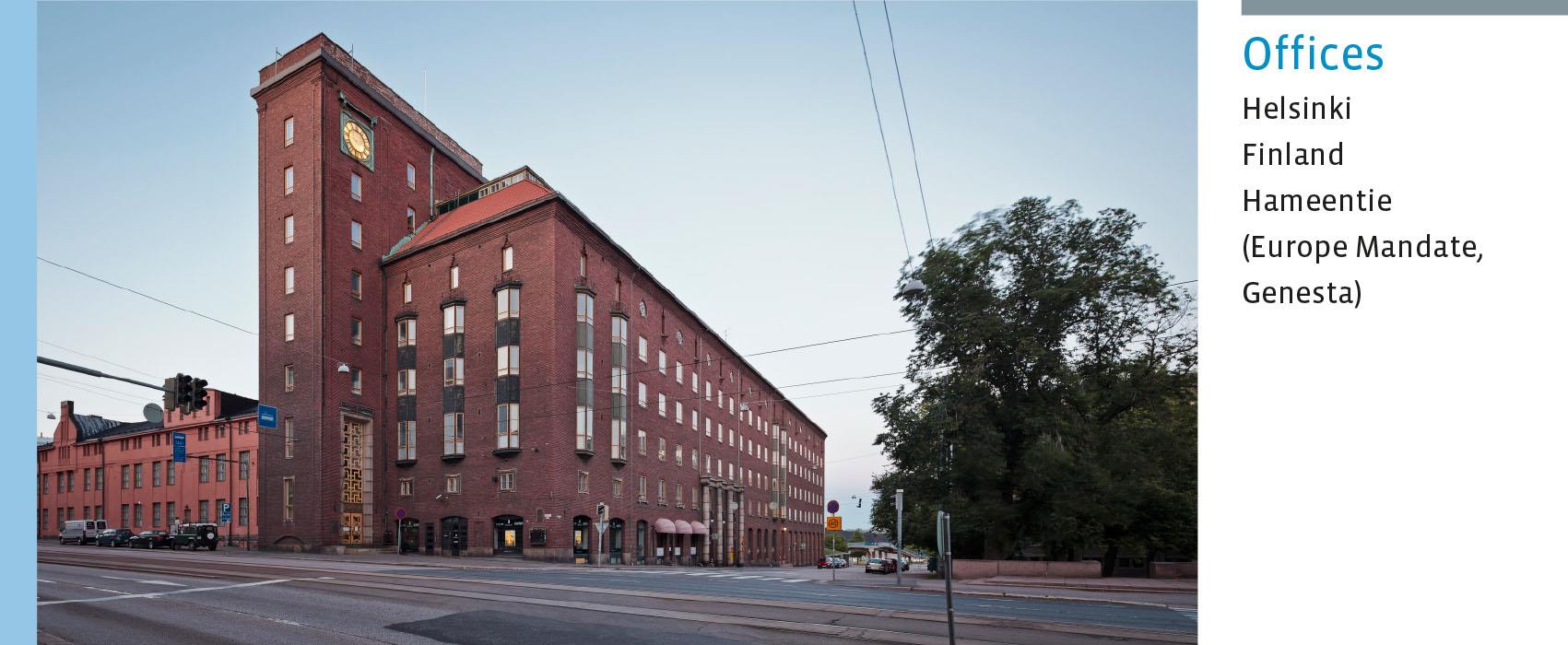
North America Mandate
The North American portfolio recorded a return of 4.3% in 2018 (2017: 6.2%). At year-end 2018, the portfolio had a value of € 1.2 billion. Over the past year, our investments included € 442 million in homes, high street shops and shops for daily groceries and logistics centres. For instance, the North America mandate invested some € 136 million in inner city homes in Los Angeles and New York and in shops in Seattle and Phoenix. The mandate also invested € 107 million in The Spiral office building in New York. The North America Mandate has an investment pipeline of € 426 million. At year-end 2018, 33% of the North American portfolio had above-average scores on the sustainability front (GRESB 4 or 5 stars). The energy use of the assets in the North America Mandate declined by 2.5% in the period 2016 – 2017.
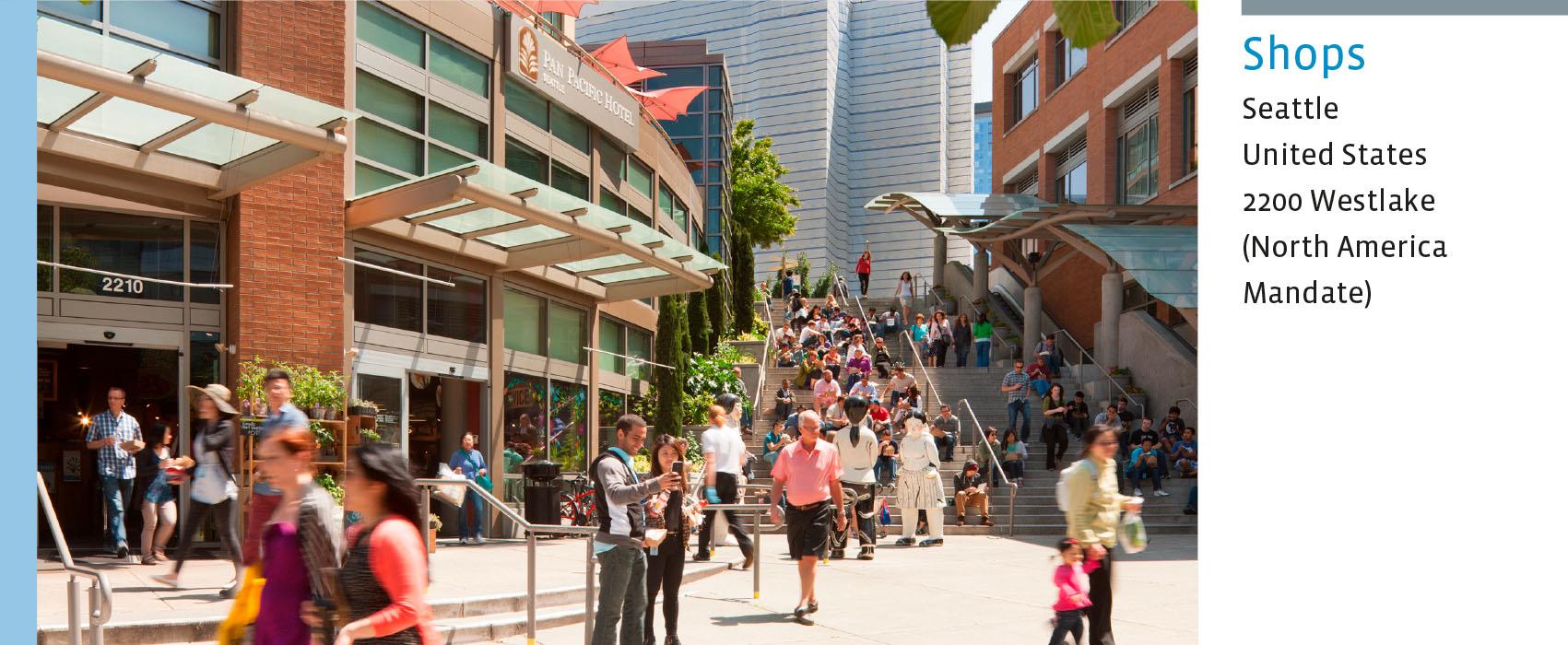
Asia-Pacific Mandate
The Asia-Pacific portfolio recorded a return of 8.9% in 2018 (2017: 16.2%). At year-end 2018, the portfolio was valued at € 893 million. In 2018, the Asia-Pacific Mandate invested a total of € 311 million in offices, retail properties, logistics and student accommodation. For instance, the mandate invested € 74 million in six residential projects in central Tokyo. The mandate invested an additional € 96 million in logistics properties in Australia, New Zealand, Japan, Singapore and Hong Kong. The Asia-Pacific Mandate has an investment pipeline of € 225 million. In 2018, 37% of Bouwinvest’s investments in the Asia Pacific portfolio had an above-average sustainability rating (GRESB 4 or 5 stars). The energy use of the assets in the Asia-Pacific Mandate declined by 7.4% in the period 2016 – 2017.
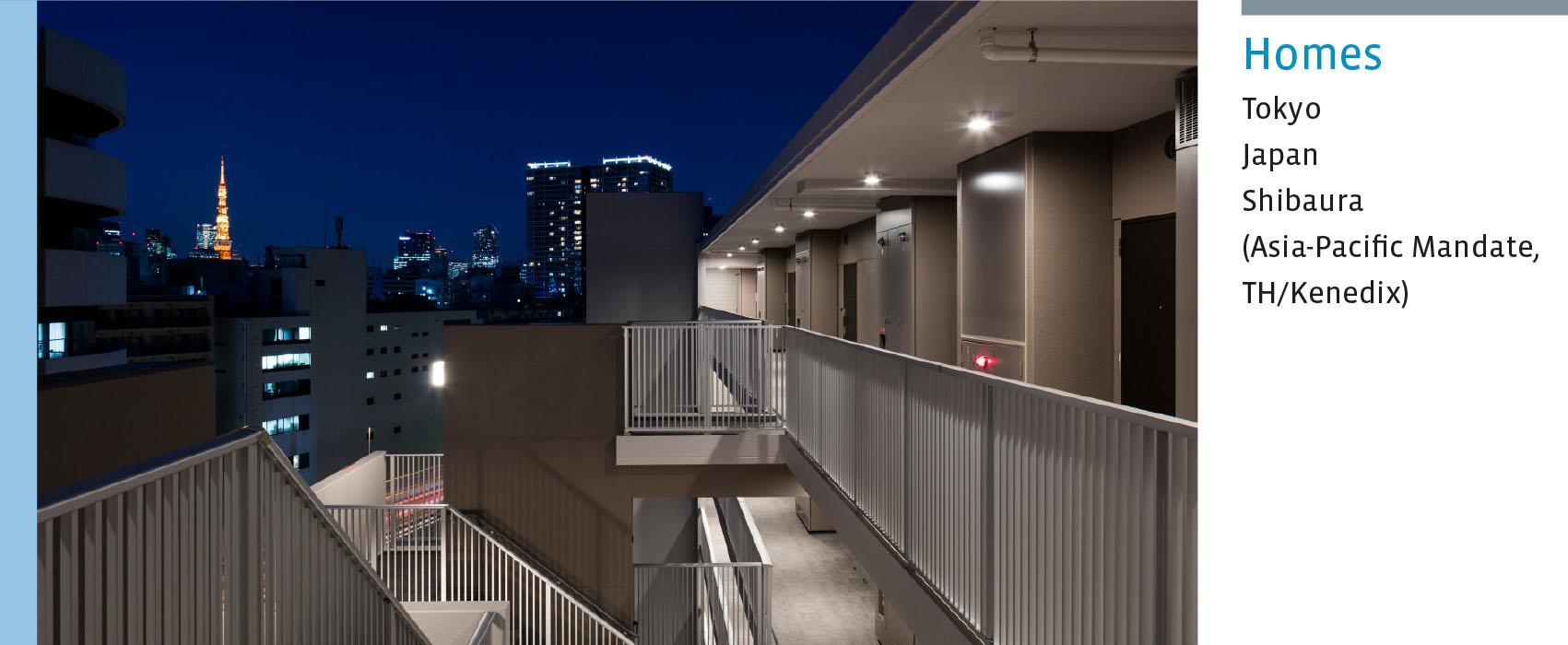
Residential Fund
The Residential Fund recorded a total return of 18.1% in 2018 (2017: 15.6%), with a direct return of 2.6% (2017: 2.8%). The indirect return came in at 15.6% last year (2017: 12.8%).
At year-end 2018, the Fund had invested capital of € 5.8 billion and the transaction volume for the year came in at € 480 million. The Residential Fund’s investments in 2018 included the Sluishuis project in Amsterdam and the Rachmaninoffhuis project in Utrecht. The Fund has an investment pipeline of € 736 million. The Fund has 20 clients and clients committed for a total of € 448 million in investments (including 1 January 2019). The Fund welcomed three new investors.
In the GRESB benchmark, the Residential Fund once again retained its GRESB 4-star rating. The energy use of the assets in the Residential Fund declined by 1.7% in the period 2017 – 2018.
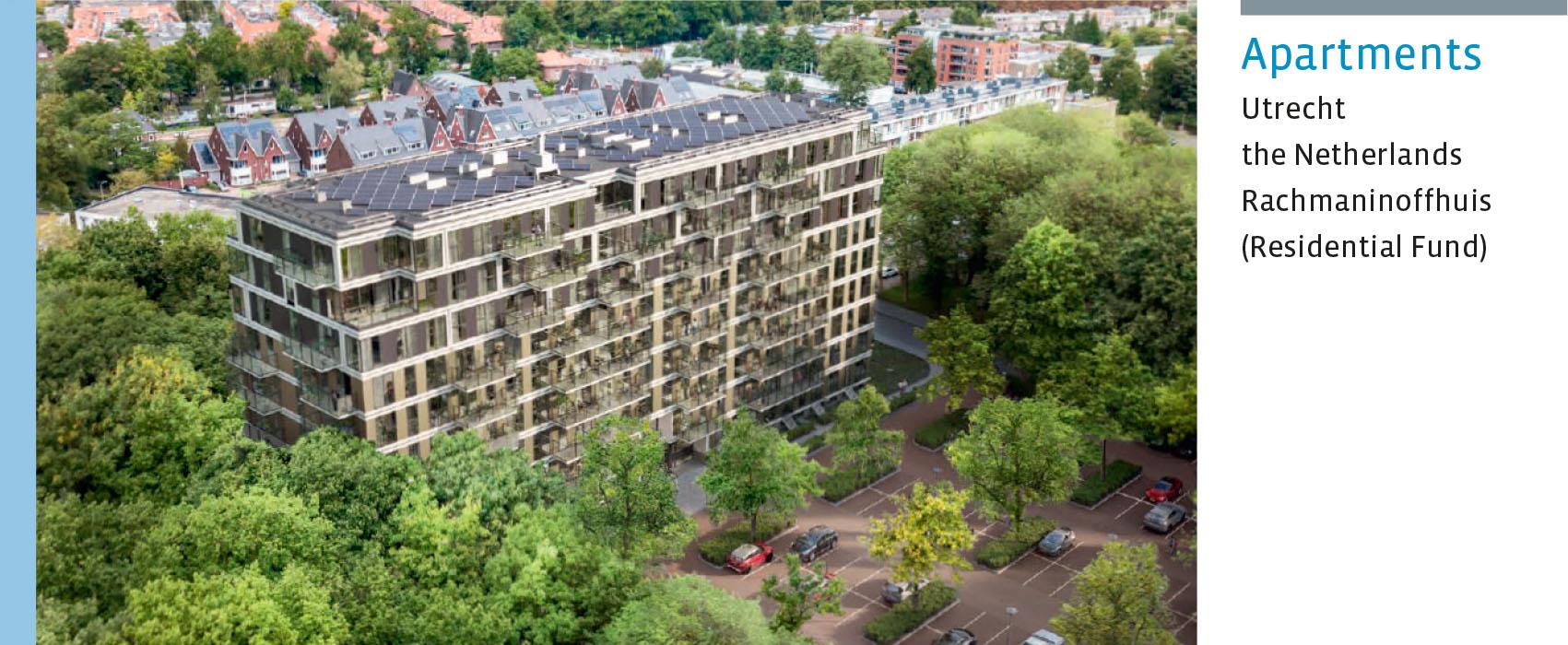
Retail Fund
The Retail Fund recorded a total return of 5.6% in 2018 (2017: 7.8%). This was the result of a direct return of 3.6% (2017: 4.5%) and an indirect return of 2.0% (2017: 3.3%).
At year-end 2018, the Fund’s invested capital stood at € 970 million and the transaction volume for the year was € 53 million. In line with its strategy, the Fund invested in shopping centres for daily groceries (convenience). For instance, the Retail Fund acquired 13 Jumbo supermarket buildings in the Overijssel, Noord-Brabant, Zeeland and Zuid-Holland provinces. The Fund also invested in the busiest shopping streets of the largest shopping cities (experience), such as Broerstraat in Nijmegen. The Fund also invested in upgrading its standing assets. Last year, the Fund started the renovation of the Muntpassage (15.800 m² - 50 retail units) in Weert, Limburg. The Fund has an investment pipeline of € 1 million. In 2018, the Fund’s clients committed for a total of € 88 million. Over the past year, the Fund welcomed one new investor (including 1 January 2019) and now has six clients (including 1 January 2019).
Last year, the Fund once again retained its GRESB 4-star rating. The energy use of the assets in the Retail Fund declined by 5.7% in the period 2017 – 2018.
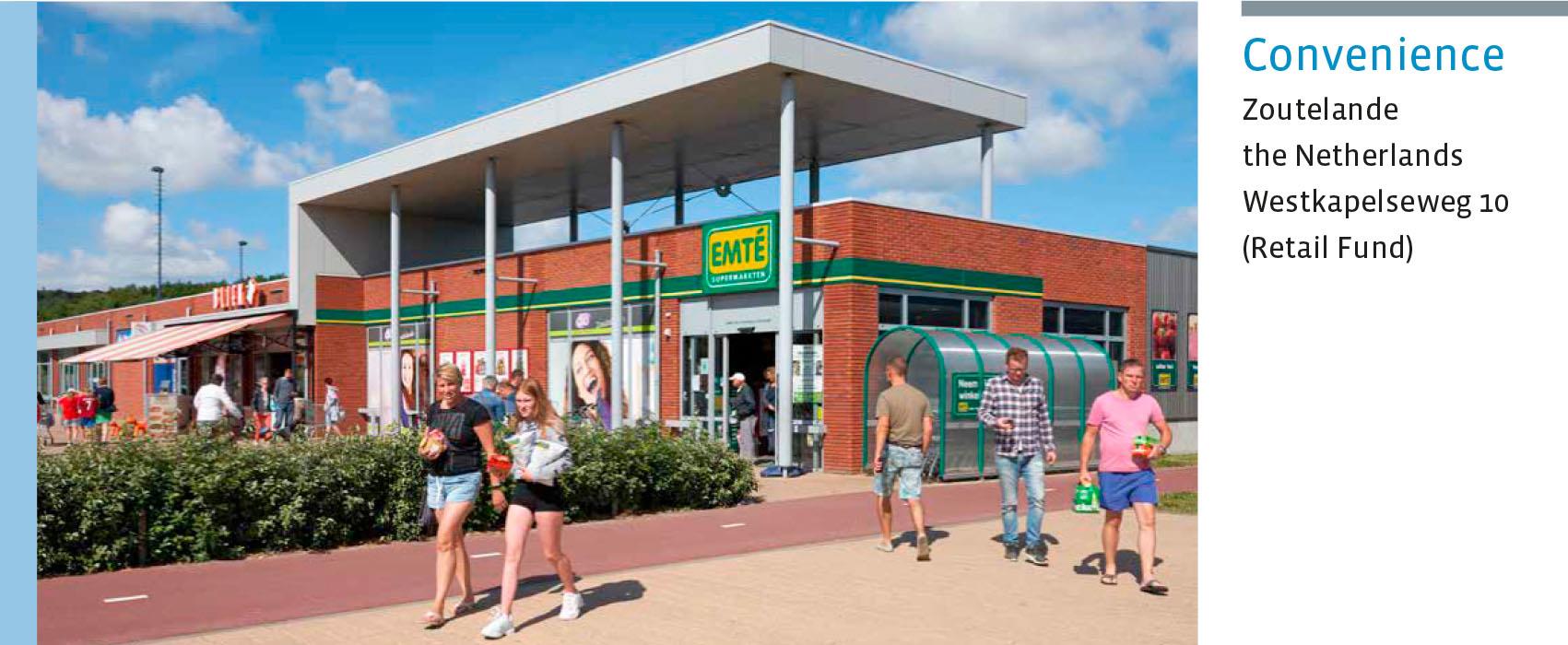
Office Fund
The Office Fund recorded a total return of 11.5% in 2018 (2017: 13.1%). The direct return came in at 2.3% (2017: 2.9%) and the indirect return was 9.2% (2017: 10.2%).
At year-end 2018, the Office Fund had invested capital of € 771 million. Last year, the transaction volume amounted to € 167 million and the Fund has an investment pipeline of € 224 million. The Office Fund acquired the new-build office building Central Park in the Central Business District of Utrecht. In 2018, clients committed for a total of € 223 million (including 1 January 2019). Over the past year, the Fund welcomed one new investor (including 1 January 2019) and now has four clients.
The Office Fund improved its GRESB score in 2018 and retained its 5-star rating, the highest rating in the GRESB universe. The energy use of the assets in the Office Fund increased by 0.3% in the period 2017 – 2018.
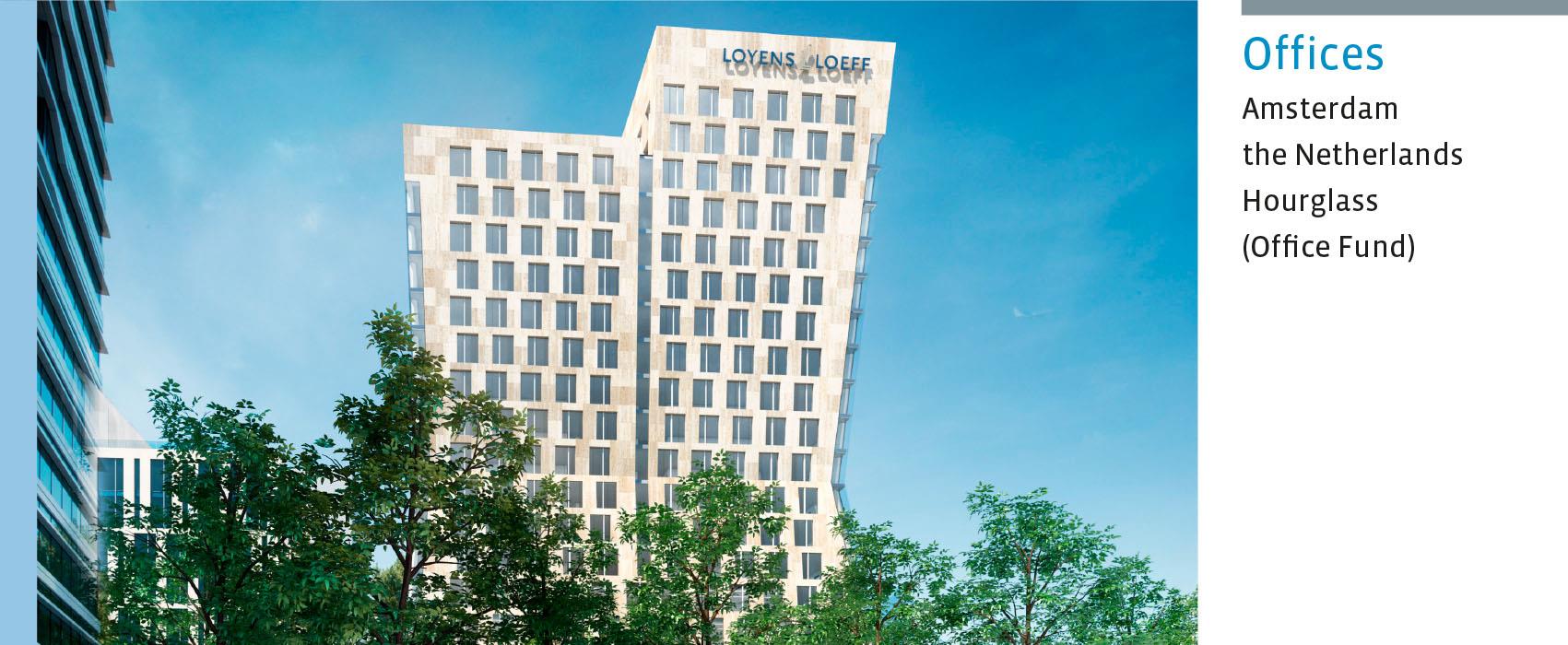
Hotel Fund
The Hotel Fund delivered a total return of 17.0% in 2018 (2017: 13.4%), with a direct return of 5.1% (2017: 5.4%) and an indirect return of 12.0% (2017: 8.0%).
At year-end 2018, the Fund had total invested capital of € 259 million and there were no transactions. The Meininger Hotel in the Amstel Tower in Amsterdam opened its doors in 2018. The Hotel Fund has an investment pipeline of € 29 million.
The Hotel Fund improved its GRESB score considerably in 2018 and raised its GRESB rating to three stars. The Hotel Fund is the global sector leader in unlisted real estate funds.
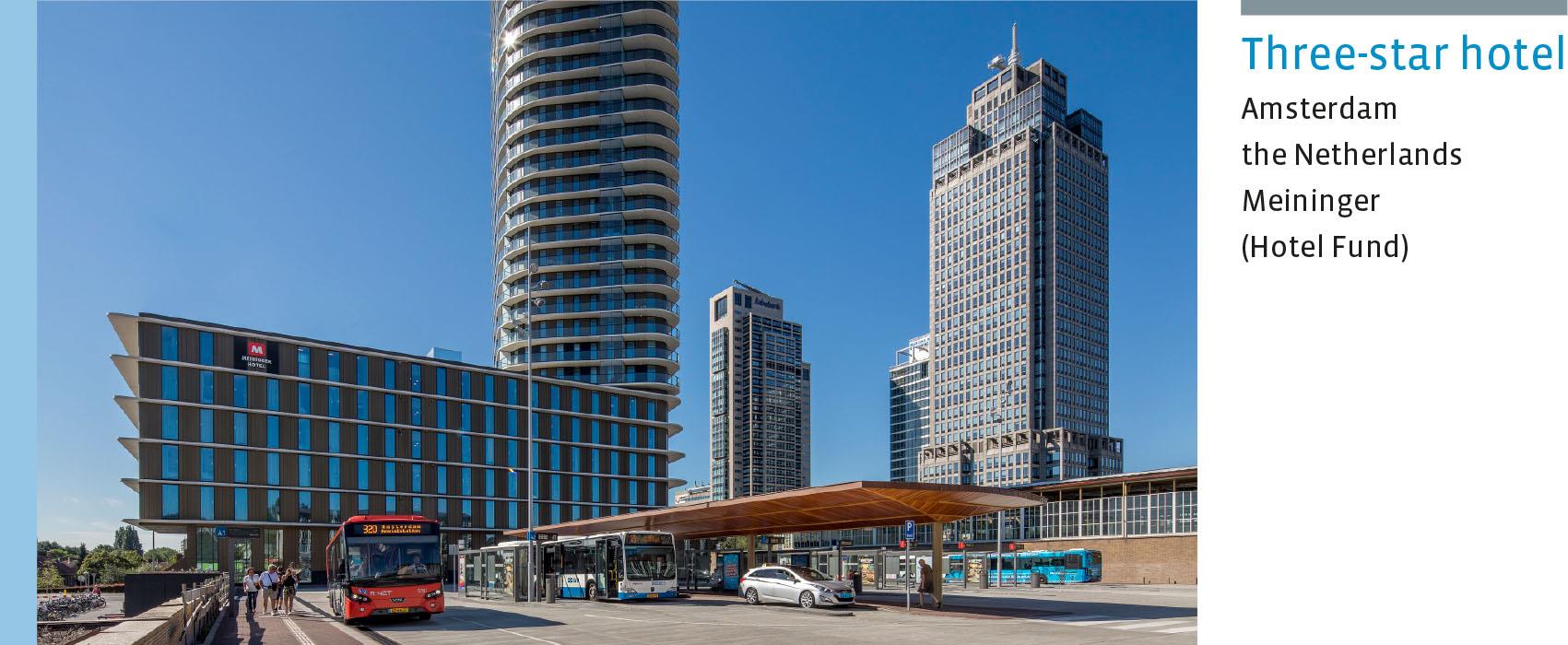
Healthcare Fund
The Healthcare Fund recorded a total return of 8.1% in 2018 (2017: 8.0%), with a direct return of 3.1% (2017: 3.0%) and an indirect return of 4.9% (2017: 5.0%).
At year-end 2018, the Fund had invested capital of € 178 million and recorded strong growth on the acquisition front. The Fund executed € 57 million in transactions for investments in independent care apartments and intramural healthcare complexes in cities including Apeldoorn, Den Bosch, Leidschendam, Almere, Heiloo, Amsterdam and Groningen. The Fund has an investment pipeline of € 53 million.
The Healthcare Fund improved its sustainability performance and was awarded a GRESB 1-star rating in 2018. The Fund’s GRESB score is relatively low, due to the fact that it has only been collecting data for the GRESB-benchmark since 2016. The Fund has set itself the target of achieving a 4-star rating in 2020.
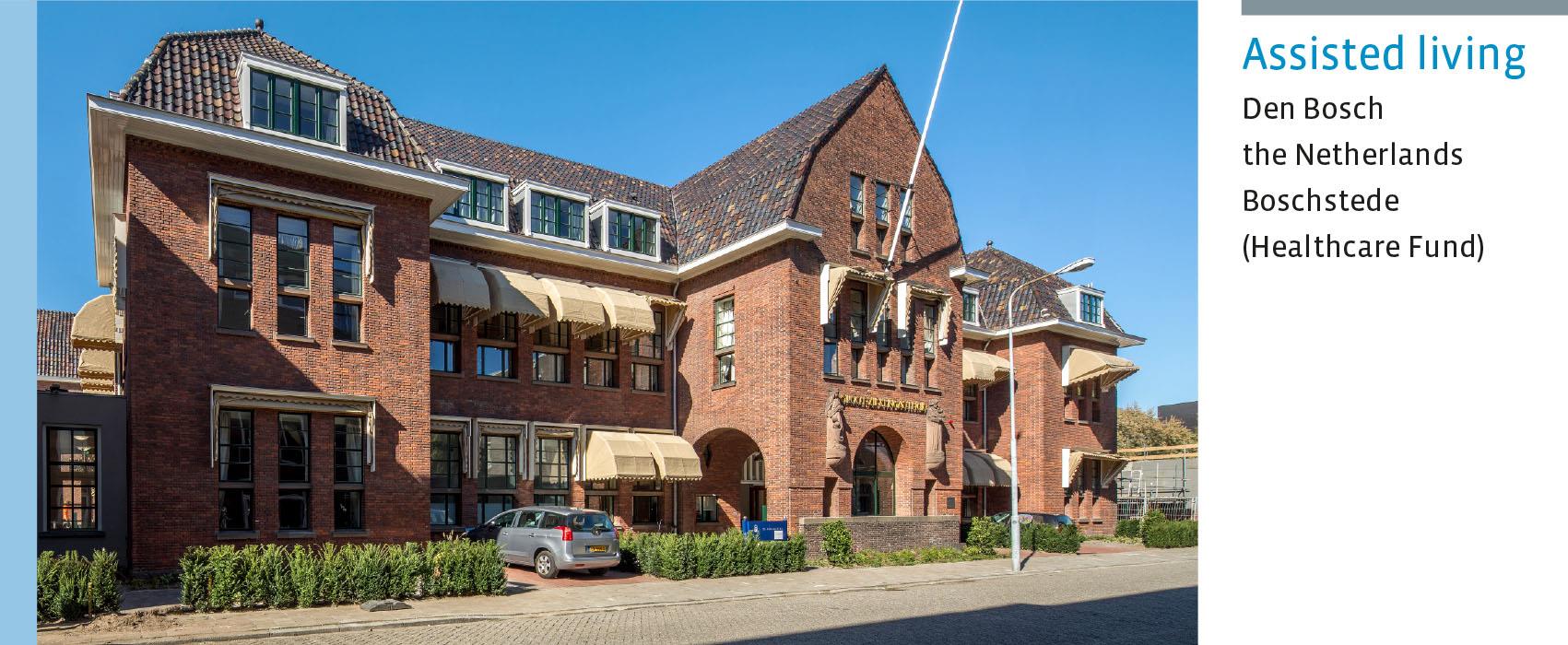
Sustainable real estate investments
Our sustainable real estate investment strategy focuses on the continuous improvement of our sustainability performance by investing in sustainable real estate, improving stakeholder value and acting as a responsible organisation.
Investing in sustainable real estate
Our main goal is to ensure that at least 70% of our invested capital has an above-average sustainability rating by 2020.
Target for improving sustainability performance | |
In 2020, at least 70% of the invested capital has an above-average sustainability rating (GRESB 4 or 5 stars) | On track:78.7 % |
Our sustainable real estate investment strategy to achieve that goal is based on two pillars: certified sustainable real estate and the reduction of our environmental impact. Sustainable real estate helps fight climate change and generates broader social, economic, ecological and health benefits. We are convinced that our approach reduces risk, helps us to generate better returns and makes our real estate and portfolios more attractive.
In 2018, Bouwinvest was once again the Dutch Green Building Council’s (DGBC) biggest client for the certification of new-build plans and buildings. Last year, 62% of Bouwinvest’s buildings had been awarded a sustainability label. The design for the Boot & Co hotel complex was awarded an Excellent certificate. And thanks to the installation of solar panels, the amount of renewable energy we generate increased to 6.0 Megawatt peak (MWp). Last year, we reduced energy consumption by 0.6% (the Dutch portfolio) and 4.5% (international mandates). Over the past few years, the Residential Fund has initiated and implemented numerous energy-saving measures and acquired thousands of energy-efficient homes. Thanks to this effort, 100% of the residential portfolio had green energy labels in Q1 2019.
Target for sustainable buildings | |
100% of Dutch portfolio labeled in 2020 | On track: 62% |
Target for environmental impact | |
Reduction of 2% per year | Not achieved: 0.6% |
3 MWp of installed capacity in 2020 | Achieved: c. 6.0 MWp |
Improving stakeholder value
One of Bouwinvest’s main priorities is to optimise its long-term relationships with its stakeholders. To gain a better understanding of the needs of our stakeholders, last year we conducted a materiality analysis (see pages 13 and 14). In addition to this, we are actively working to increase awareness of environmental and social issues and good governance in the real estate sector. This is why we sponsored the Dutch Green Building Week in 2018.
In 2018, Bouwinvest and more than 60 other real estate market players developed the Sustainable Renovation Deltaplan. This is a multi-year sustainable development programme for the likes of shops, supermarkets, offices, logistics centres and social real estate, including schools and healthcare institutions. We want to achieve the goals laid out in this plan by 2040, 10 years ahead of the target of 2050 set by the current government. We believe this is necessary if we are to meet the targets set in the Paris climate agreement.
Last year, we also worked on safety at construction sites. In the agreements we closed with project developers and construction firms, Bouwinvest included the condition that the related construction sites should be registered with the Dutch Considerate Constructors scheme (Bewuste Bouwers). Back in 2017, we set the target of having more than 50% of our construction projects registered with the Considerate Constructors scheme. In 2018, 20 constructions sites (46%) had been registered (2017: 18; 43%).
In addition to this, Bouwinvest is a member of sector organisations and is involved in various sustainability initiatives. The Bouwinvest Board of Directors and employees actively participate in working groups or the boards of ULI, GRESB, DGBC, FSC the Netherlands, NEPROM, ANREV, AFIRE, INREV and IVBN. You will find a more detailed list of the (board) positions in (network) organisations occupied by Bouwinvest employees in the addendum.
Targets for improving stakeholder value | |
Conducting a client and tenant satisfaction survey every two years | Partly achieved. Client survey not conducted |
Satisfaction score of > 7 | Achieved: tenant satisfaction score 7.3 |
Minimum of 50% of building sites registered as considerate building site | Not achieved: 46% registered |
Being a responsible organisation
We run our business on the basis of integrity, honesty and transparency and we respect the interests of those with whom we maintain relationships. We have embedded these values throughout our organisation and included them in our code of conduct. We believe integrity, honesty and corporate social responsibility are essential to ensure that we do our work properly. These conditions will enable us to optimise returns for our clients. To guarantee accountability and transparency and progress on these fronts, we set targets based on international sustainability standards. We will include these themes in the reputation survey we are planning to conduct in 2019.
Target for being a responsibe organisation | |
Zero incidents as a result of negligence | No issues |
Summary of results 2018
In 2018, Bouwinvest achieved the following results on the sustainable real estate investment front:
| | Results responsible investment |
Continuous improvement of our sustainability performance
| 79% above-average sustainable investments total portfolio (GRESB 4/5 Stars) (2017: 76%) |
94% of the Dutch investments had GRESB 4/5 stars in 2018 (2017: 93%) |
41% of th investments in the international mandates had GRESB 4/5 stars in 2018 (2017: 34%) |
Transparency: |
As they did last year, all the Dutch sector funds particated in GRESB. |
75% of the international mandates (on the basis of invested capital) participated in GRESB. This is a rise of 3% compared with 2017 |
Sustainability performance: |
The Dutch funds have an average GRESB score of 79 points (2017: 74) |
The average GRESB score of the international mandates in 2018 (75 points) is five points higher than the previous year and seven points higher than the GRESB global average in 2018 (68 points)* |
Investing in sustainable real estate | Sustainable building certificates |
62% of the total floor space of the Dutch funds has been awarded a sustainable building certificate (2017: 31%) |
The International mandates scored an average of 56 points (2017: 54) on the component sustainable building certificates in GRESB. This is five points higher than the global average .* |
Reducing environmental impact |
Renewable energy: |
The buildings in the Dutch funds had solar panels generating c. 6.0 MWp of electricity in 2018. This was an increase of 3.8 MWp compared with 2017. |
25% of the energy consumption of the international investments came from renewable sources in 2018 * |
| |
Reduction of energy consumption: |
The Dutch portfolio recorded a like-for-like energy reduction of 0.6% compared with 2017. |
The International mandates recorded a 4.5% reduction in energy consumption compared with the previous year* |
| |
Energy-efficient buildings: |
95% of the Dutch portfolio has a green energy label (A, B, C) and the average energy index improved to 1.15 |
| |
Improving stakeholder value | 46% of the construction projects were registered as Considerate Building Sites (2017: 43%). |
23 of Bouwinvest's employees have active positions on 26 boards or working groups of the following organisations: IVBN, ANREV, INREV, AFIRE, VBA, ULI, DGBC and NEPROM |
| | |
* Results of the most recent GRESB benchmark 2018 |